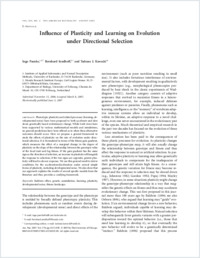Influence of plasticity and learning on evolution under directional selection
- Paenke, Ingo Institute of Applied Informatics and Formal Description Methods, University of Karlsruhe, Germany
- Sendhoff, Bernhard Honda Research Institute Europe, Offenbach/Main, Germany
- Kawecki, Tadeusz J. Department of Biology, University of Fribourg, Switzerland
-
05.06.2007
Published in:
- American Naturalist. - 2007, vol. 170, no. 2, p. E47-E58
English
Phenotypic plasticity and related processes (learning, developmental noise) have been proposed to both accelerate and slow down genetically based evolutionary change. While both views have been supported by various mathematical models and simulations, no general predictions have been offered as to when these alternative outcomes should occur. Here we propose a general framework to study the effects of plasticity on the rate of evolution under directional selection. It is formulated in terms of the fitness gain gradient, which measures the effect of a marginal change in the degree of plasticity on the slope of the relationship between the genotypic value of the focal trait and log fitness. If the gain gradient has the same sign as the direction of selection, an increase in plasticity will magnify the response to selection; if the two signs are opposite, greater plasticity will lead to slower response. We use this general result to derive conditions for the acceleration/deceleration under several simple forms of plasticity, including developmental noise. We also show that our approach explains the results of several specific models from the literature and thus provides a unifying framework.
- Faculty
- Faculté des sciences et de médecine
- Department
- Département de Biologie
- Language
-
- English
- Classification
- Biological sciences
- License
- License undefined
- Identifiers
-
- RERO DOC 8091
- DOI 10.1086/518952
- Persistent URL
- https://folia.unifr.ch/unifr/documents/300333
Statistics
Document views: 158
File downloads:
- kawecki_ipl.pdf: 247
